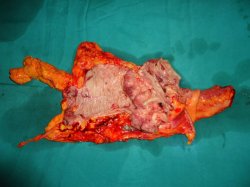Cancer

In the most basic terms, cancer refers to cells that grow out-of-control and invade other tissues. Cells become cancerous due to the accumulation of defects, or mutations, in their DNA.
Certain inherited genetic defects and infections can increase the risk of cancer. Environmental factors and poor lifestyle choices such as smoking and heavy alcohol use can also damage DNA and lead to cancer.
Most of the time, cells are able to detect and repair DNA damage. If a cell is severely damaged and cannot repair itself it undergoes so-called programmed cell death or apoptosis. Cancer occurs when damaged cells grow, divide, and spread abnormally instead of self-destructing as they should.
Gastric (stomach) cancer is a disease in which malignant (cancer) cells form in the lining of the stomach. The stomach is in the upper abdomen and helps digest food.
Almost all gastric cancers are adenocarcinomas (cancers that begin in cells that make and release mucus and other fluids). Other types of gastric cancer are gastrointestinal carcinoid tumors, gastrointestinal stromal tumors, and lymphomas.
Infection with bacteria called H. pylori is one of common cause of gastric cancer.
Gastric cancer is often diagnosed at an advanced stage because there are no early signs or symptoms.
Symptoms of gastric cancer include indigestion and stomach discomfort or pain.
These and other signs and symptoms may be caused by gastric cancer or by other conditions.
In the early stages of gastric cancer, the following symptoms may occur:
 Indigestion & abdomen discomfort.
Indigestion & abdomen discomfort. A bloated feeling after eating.
A bloated feeling after eating. Mild nausea.
Mild nausea. Loss of appetite.
Loss of appetite. Heartburn.
Heartburn.
In more advanced stages of gastric cancer, the following signs and symptoms may occur:
 Blood in the stool. ( Malena- Black Tarry stool)
Blood in the stool. ( Malena- Black Tarry stool) Vomiting.
Vomiting. Weight loss and Anorexia for no known reason.
Weight loss and Anorexia for no known reason. Stomach pain.
Stomach pain. Jaundice (yellowing of eyes and skin).
Jaundice (yellowing of eyes and skin). Ascites (build-up of fluid in the abdomen).
Ascites (build-up of fluid in the abdomen). Trouble swallowing.
Trouble swallowing.
Check with your doctor if you have any of these problems.
Tests used to diagnose gastric- esophagus cancer.
1. Physical exam and history : An exam of the body to check general signs of health, including checking for signs of disease, such as lumps or anything else that seems unusual. A history of the patient’s health habits and past illnesses and treatments will also be taken.
2. Blood Tests
3. Upper GI endoscopy : A procedure to look inside the esophagus, stomach, & duodenum (first part of the small intestine) to check for abnormal areas. An endoscope(a thin, lighted tube) is passed through the mouth and down the throat into the esophagus. ( See the section Endoscopy)
4. Barium swallow : A series of x-rays of the esophagus and stomach. The patient drinks a liquid that contains barium (a silver-white metallic compound). The liquid coats the esophagus and stomach, and x-rays are taken. This procedure is also called an upper GI series.
5. CT scan of Thorax and abdomen : The pictures are made by a computer linked to an x-ray machine. A dye may be injected into a vein or swallowed to help the organs or tissues show up more clearly. This procedure is also called computed tomography.
6. Biopsy : The removal of cells or tissues so they can be viewed under a microscope to check for signs of cancer. A biopsy of the stomach is usually done during the endoscopy. The reporting might take 2 days time for final diagnosis.
Stomach cancer may be treated with surgery (Laparoscopy or Open), radiation therapy, chemotherapy, or targeted therapy. Often, a combination of these treatments is used. It can be difficult to cure stomach cancer because it is often not detected until it is at an advanced stage.
Treatment options and recommendations depend on several factors, including the type and stage of cancer, possible side effects, and the patient’s preferences and overall health. Your care plan may also include treatment for symptoms and side effects, an important part of cancer care.
Take time to learn about all of your treatment options and be sure to ask questions about things that are unclear. Also, talk about the goals of each treatment with Gateway Cancer care Team doctors and what you can expect while receiving the treatment.





